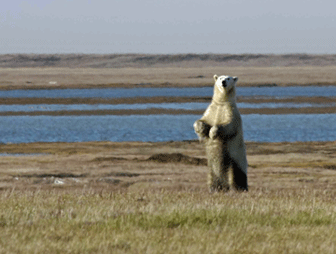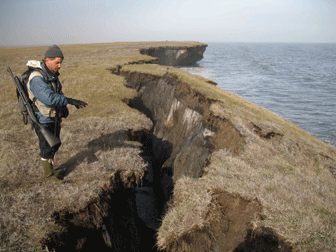Researchers evade polar bear displaced by melting sea ice
Researchers evacuated due to polar bear trapped on land by melting sea ice
WCS
August 7, 2008
|
|
The Wildlife Conservation Society (WCS) evacuated five of its scientists from a remote camp in northern Alaska because of a new and unusual threat: a polar bear stuck on land due to climate change. Polar bears would normally be out on sea ice this time of year, but with recent warming the ice is miles from shore and bears are becoming increasingly trapped on land well away from their usual seal prey.
“It is ironic that our efforts to understand how climate change is affecting wildlife were disrupted by the top Arctic predator displaced by climate,” said Dr. Steve Zack of WCS. Dr. Zack and Mr. Liebezeit, who lead the Arctic studies for WCS, will continue their work on post-breeding shorebirds in the Prudhoe Bay region this season.
Although the crew had bear safety training, the uncertainty of how dangerous this or other polar bears in the region might be led to the decision to charter a bush pilot to get the crew out before a major storm made such a rescue unlikely for days.
 Image by Mark Maftei, Wildlife Conservation Society  Joe Liebezeit examines tundra erosion at Beaufort Sea edge, image by Kevin Pietrak, Wildlife Conservation Society |
“We saw the polar bear on our first clear day after several days of poor weather. The bear didn’t come near us, but the prospect of maintaining a round-the-clock vigil while trying to do our surveys had us concerned,” said Joe Liebezeit, conservation scientist for WCS. The field camp has food supplies for several weeks.
Polar bears have been trapped on land in Arctic Alaska all spring and summer unable to swim out to sea ice and pursue seals. Their condition and how dangerous they might be is unknown.
The crew was conducting surveys of shorebirds feeding on the shorelines prior to their southward migrations. The shorelines north of Teshekpuk Lake on the Beaufort Sea have experienced dramatic erosion because of the warming climate.
The study was an attempt to understand how such erosion was affecting the ability of millions of shorebirds attempting to gain enough food energy to fuel their southward migrations to Asia, South America, and many other distant sites.